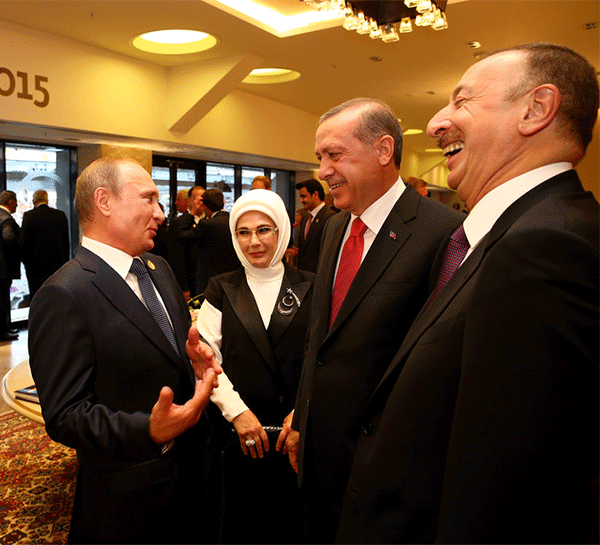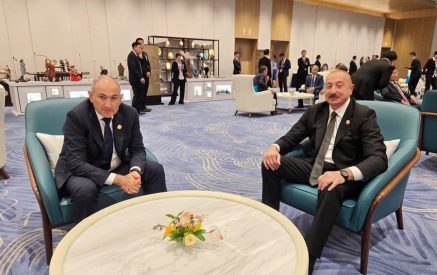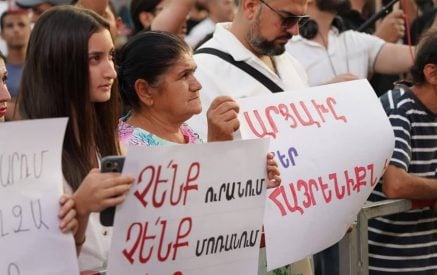According to Haykak Arshamyan, it can become a serious threat for Armenia and the Nagorno-Karabakh conflict settlement
Germany support the dialogue between Turkey and Armenia
On June 2, the Germany Bundestag almost unanimously recognized the Armenian Genocide. German Chancellor Angela Merkel’s statement after the vote in the Bundestag was noteworthy when she mentioned that the German Government intends to promote the establishment of a dialogue between Armenia and Turkey, including through the reconsideration of the events in the Ottoman Empire. “Germany and Turkey are in close bonds. Approximately 3 million people of Turkish origin live in Germany. That is why, I and the entire Government of Germany intend to contribute to the establishment of a dialogue between Armenia and Turkey,” Merkel said. In an interview with journalists, Ambassador Extraordinary and Plenipotentiary of the Federal Republic of Germany to the Republic of Armenia, Matthias Kiesler, made a more specific statement recently, noting that in the future, Berlin will make additional efforts toward the normalization of the relations between Armenia and Turkey. “Germany has numerous projects aimed at forging closer relations between the civil societies of Armenia and Turkey. I think that yesterday’s resolution will be an impetus to have more in this direction. In the long-run perspective, certainly, we would like to see that one day, diplomatic relations will be established between Armenia and Turkey, and the Armenian-Turkish border will be opened,” – added the Ambassador.
Turkey has two ways
Read also
Despite the abundance of critical statements by Turkey against Germany in the last few days, Germany confirmed that it will support the dialogue between Turkey and Armenia, and it is necessary to do more for the reconciliation between Turkey and Armenia. In October 2009, in Zurich, foreign ministers of Armenia and Turkey signed two documents on establishing diplomatic relations and developing relations between the two countries. The protocols were to be ratified by the parliaments of the two countries, but Turkey refused to do, thus, in April 2010, Armenian President Serzh Sargsyan signed a decree on suspending the ratification of the Armenian-Turkish protocols. In February last year, S. Sargsyan signed a decree on recalling the protocols from the National Assembly.
After the four-day war in April, today, more than ever, the normalization of the Armenia-Turkey relations seems unrealistic. Official Ankara long ago views the pro-Azerbaijani solution of the Karabakh conflict as a precondition for the normalization of Armenia-Turkey relations. During the war days in April, Ankara officially congratulated Aliyev for the “victory”, showing that it supports Aliyev even in the case of unleashed war.
In an interview with “Aravot”, Haykak Arshamyan, the expert of the Center for Regional Studies, recalling the “football diplomacy”, said that it showed that Armenia’s authorities, however, tried somehow to normalize the relations with Turkey and were in favor of the opening of the border, “We remember what serious resistance it caused both in the Armenian public, among some political parties and the Diaspora. In any case, the authorities showed that they are trying to demonstrate good will in this process.”
Addressing the developments going on in Turkey today, our interlocutor note, “Today, we must try first of all to understand what is going on in Turkey. Turkey now has two ways. First, either it will be turned into a dictatorial country headed by Erdoğan, in other words, destruction of the free media, which is already taking place, any dissent will be rooted out, the layer of intellectuals and young people who are trying to go against the processes happening in Turkey, like they managed to break the Kurds’ resistance, which I do not consider it very likely, or Turkey will be destroyed in the result of Kurdish and other minorities’ resistance and due to the serious problems with all its neighbors.
In other words, either Turkey should close its borders and pass to a self-service mode, or if it remains open at least as it is now, then its borders are very weak and unstable, as well as it has huge problems inside that are not only associated to Kurds. These are domestic political and internal party fight associated with different vectors generated inside Erdoğan’s party.” H. Arshamyan is convinced that today no matter Europe nursed Turkey and tried to restrain the flow of refugees through Turkey to Europe, it failed, “Parallel to the promise to receive money from the EU, Turkey opened the roads to Europe, which resulted in millions of refugees going to Europe. Everyone understands very well that it is a game, it is just a mean by Erdoğan to tear off money from the EU. What did Erdoğan do? As you know, in recent decades, Turkey was ruled by the military elite.
Erdoğan, however, destroyed the elite. But what Erdoğan strives to create today may possibly work against him. Todays’ Turkey has these two ways.” Our interlocutor believes that unfortunately we are dependent on the processes going on in Turkey today and in the future, “Naturally, I am in favor of the opening of the Armenian-Turkish border, which can become an alternative for us in different ways, certainly, I am in favor of the normalization of the Armenian-Turkish relations as well as the reconciliation but today, Turkey is not the country with whom you can dialogue. If you remember, in his speech in February this year, Serzh Sargsyan noted that there is nothing else to do with Turkey, and it was a message not only to Turkey but to the West too.
This meant the end of the de facto football diplomacy, although de facto it has been over long ago. Indeed, we have nothing to do at this point because the settlement of relations with Armenia is not the third or the tenth item in the Turkish political agenda but it is not there at this point. No matter Turkey tries to support and applaud Azerbaijan on the settlement of the Karabakh conflict, actually, this issue too is secondary for Turkey now. The primary task for Erdoğan is the establishment of his visualized stability inside the country, he has so many serious problems inside the country that his hand will not be reached to the Karabakh conflict, no matter it is tried.” At the same time, Haykak Arshamyan drew the attention to the fact that some attempts are observed for relaunching the Russian-Turkish relations, “On one hand, the Turkish leadership is speaking about the need it, on the other hand, Russia is already making remarks on it at the highest level. If the next Russian-Turkish rapprochement takes place, then this could become a serious threat for Armenia and the Nagorno-Karabakh conflict settlement.”
Emma GABRIELYAN
“Aravot” 07.06.2016
























































